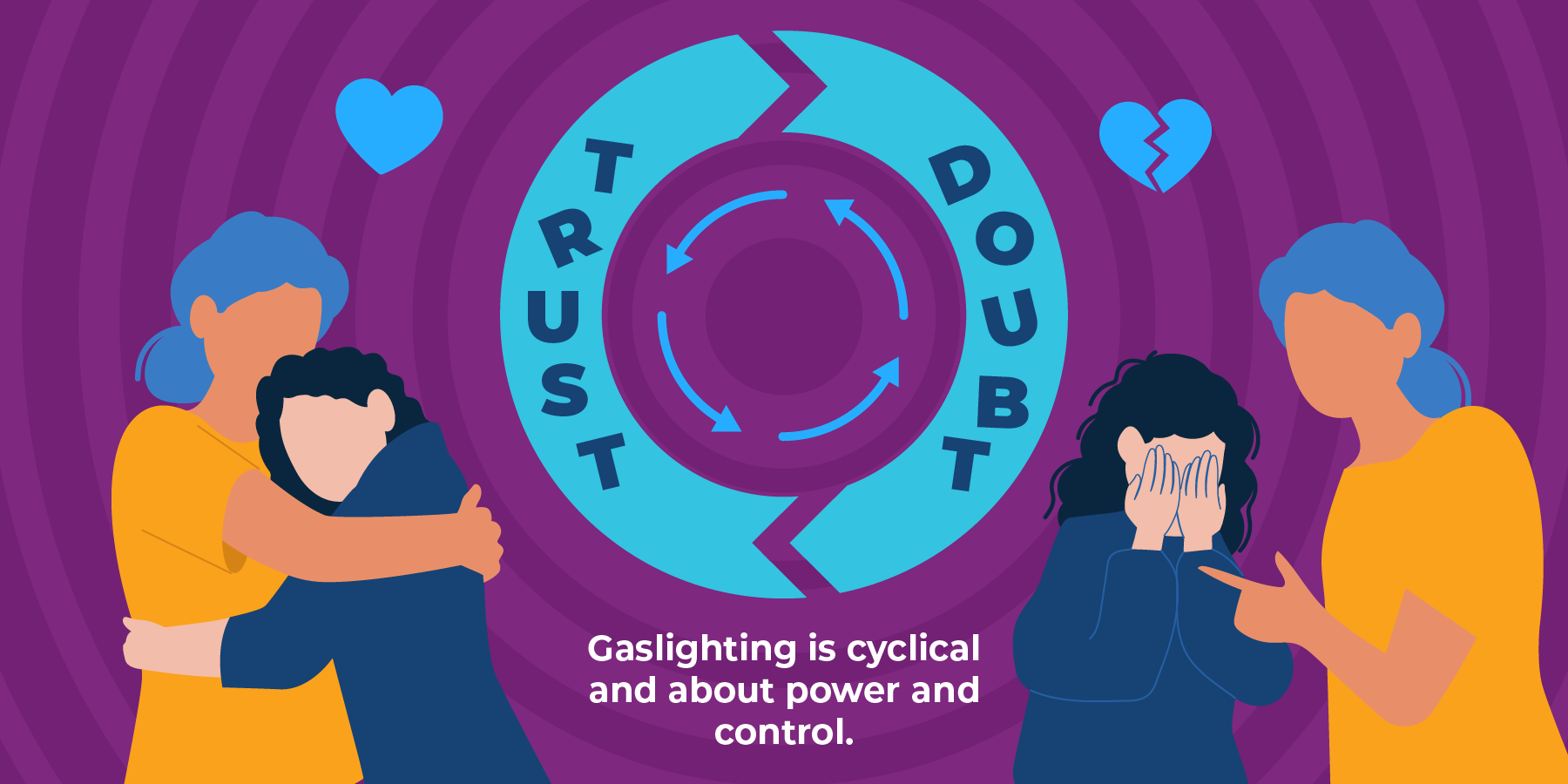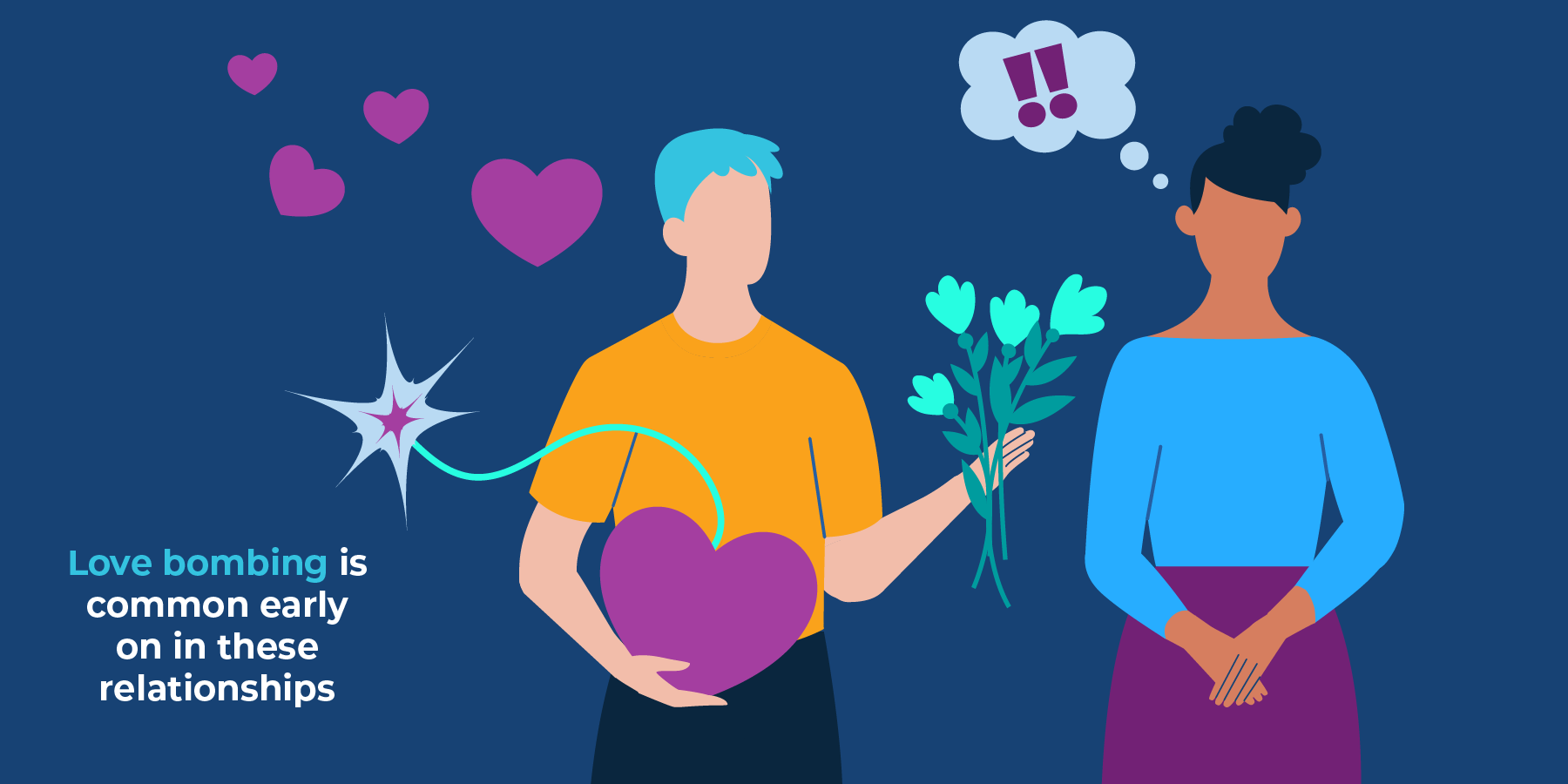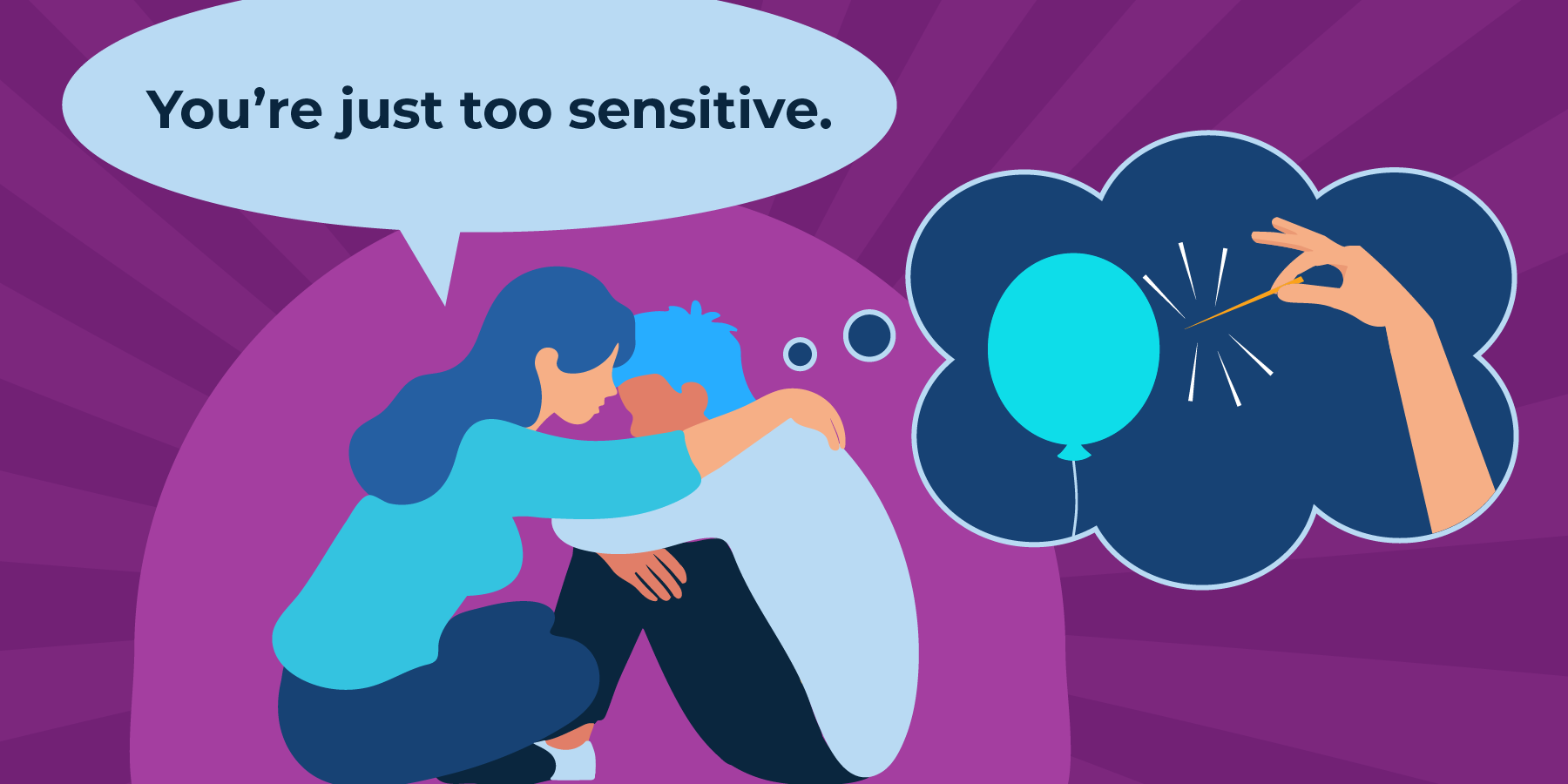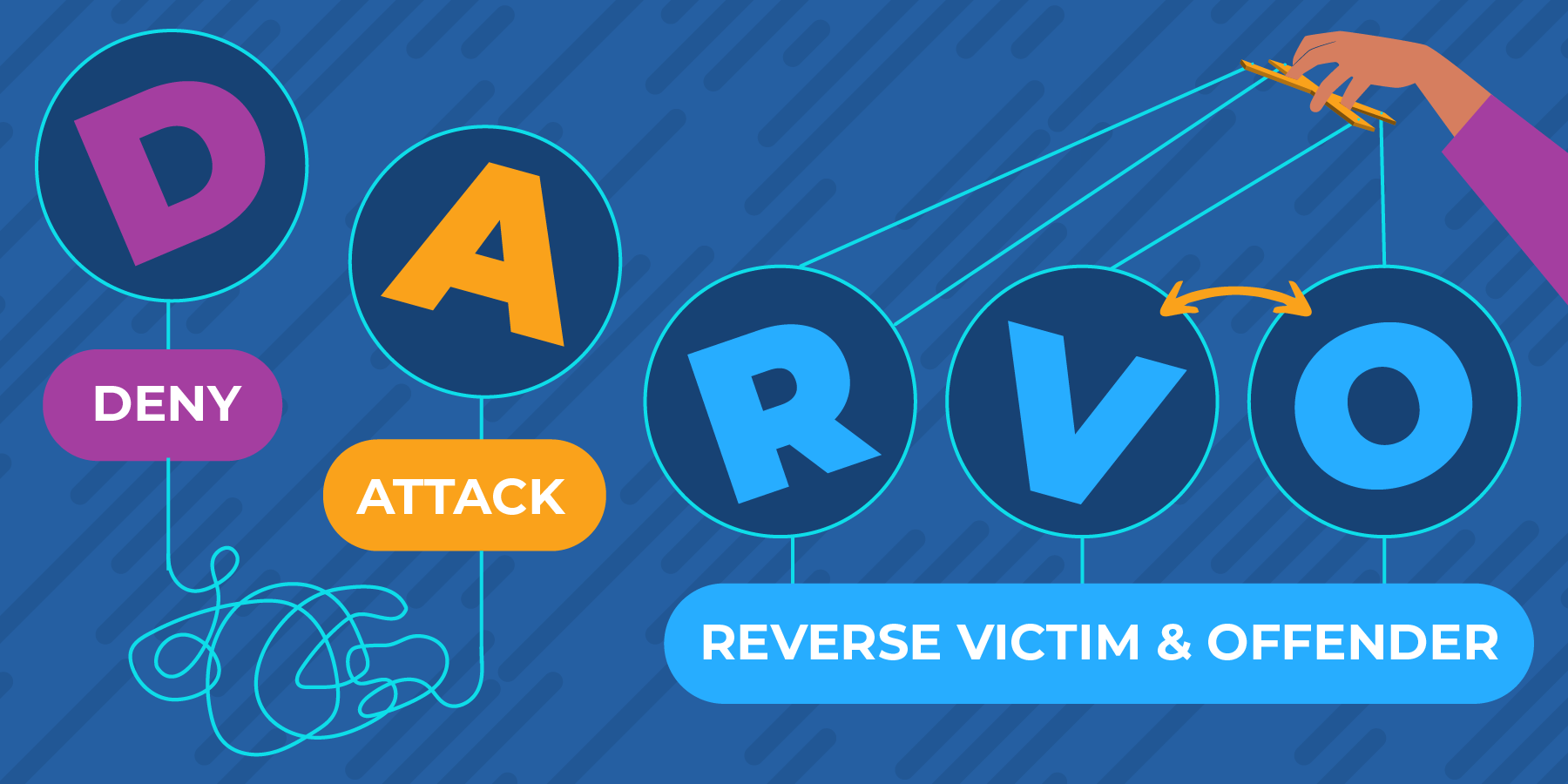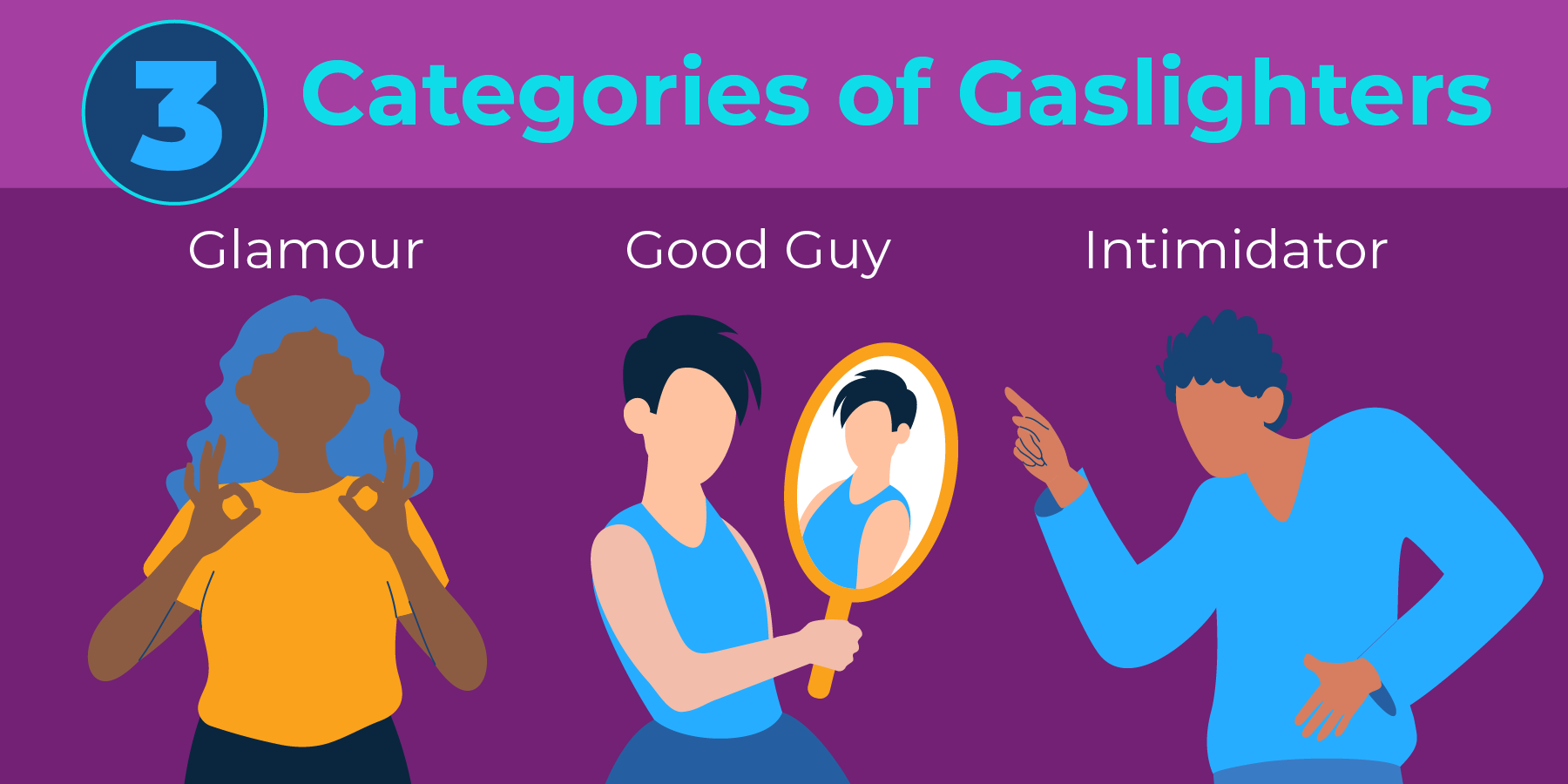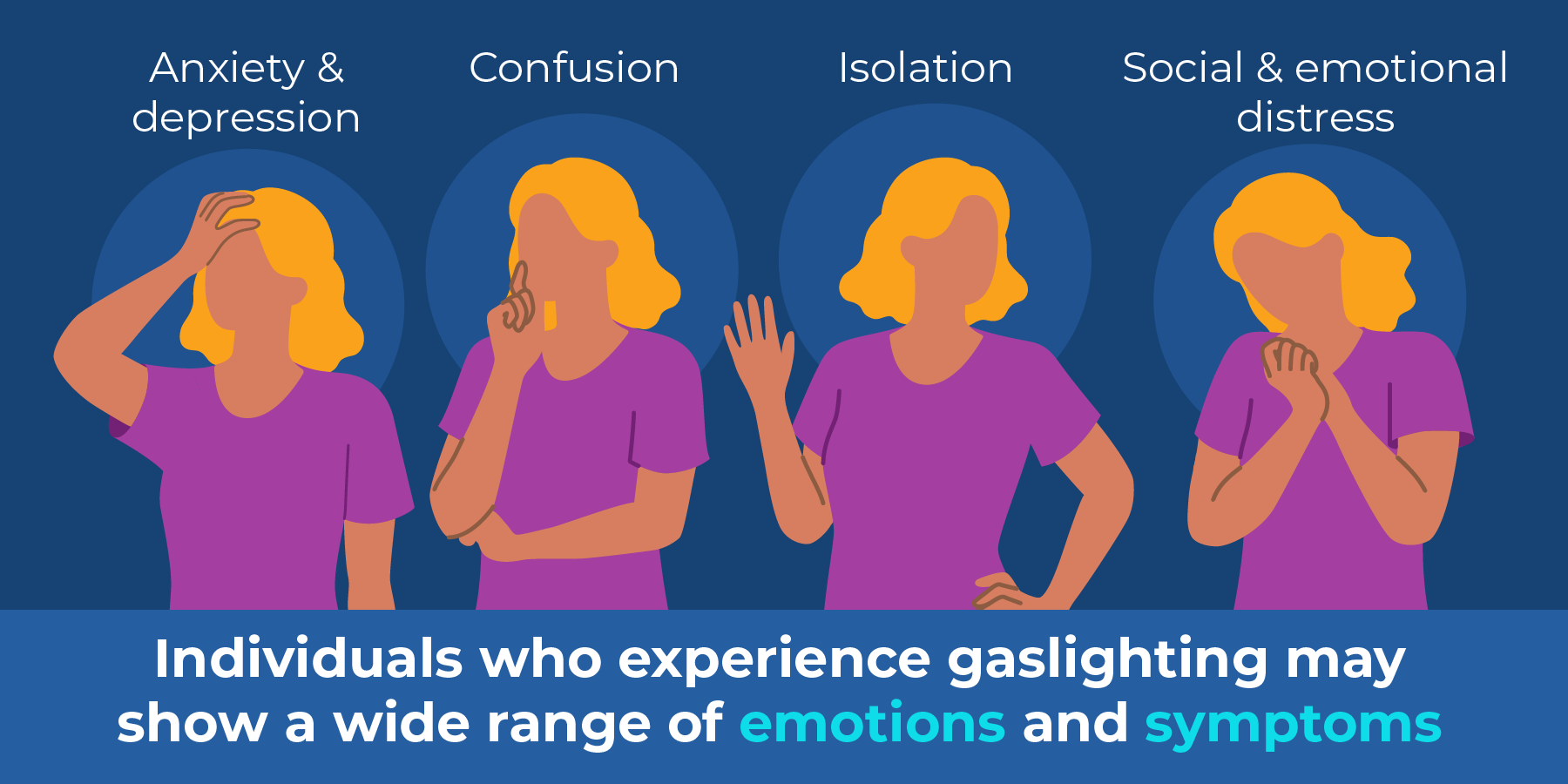“You sound crazy. That isn’t how it happened.”
Gaslighting is a subtle and destructive form of abuse where the perpetrator gains control over their victim by causing them to question their sense of reality.
It has gained attention and become a popular topic on social media. It even earned the word of the year in 2022.
Understanding the signs of gaslighting and relationship red flags can help empower you or a loved one to break free from this form of emotional manipulation.
Gaslighting Meaning
What Is Gaslighting?
Gaslighting is the psychological manipulation of another person over time that causes them to question their reality by using lies, dismissing concerns, and shifting blame.
Gaslighting is a form of psychological violence that leads to the person being gaslit to question their faults, their beliefs, and even their sense of reality.
Gaslighting behavior can harm a person’s self-esteem, self-confidence, and mental health.
It is normal in any relationship for people to occasionally lie or argue about events that happened.
The key difference between normal, healthy conflict and the abuse of gaslighting is that gaslighting is a repeated set of behaviors that causes the victim to rely on the abuser as the only person who can tell them the truth.
This behavior allows the gaslighter to have power and control over their victim, since the victim can’t trust their own perception.
It’s most commonly associated with intimate relationships and romantic relationships.
However, it also occurs in other situations, such as between friends, within families, between patients and medical providers (also known as medical gaslighting), and in the workplace.
Where Did the Term Gaslighting Come From?
The term gaslighting comes from the 1938 British stage play Gas Light, where a man convinces his wife that she is losing her mind so that he can steal valuables in the home.
The husband makes her believe she is a kleptomaniac and is only imagining the sounds in her attic and the gaslights dimming in her home.
In reality, sounds are coming from her attic, and he is the one who is dimming the gaslights in the evening.
Her husband caused her to doubt her reality so that he could search for the woman’s aunt’s missing jewels in the home after dark.
The play later became a hit film, and the term “gaslight” became used in the sociology field to describe this form of manipulation.
It’s most often talked about in the context of toxic relationships, but it can happen in families, workplaces, or even public life.
What Does Gaslighting Mean in a Relationship?
Gaslighting in a relationship means that one partner is using psychological manipulation to control the other so that the victim becomes emotionally dependent on the gaslighter.
Gaslighting is never a part of a healthy relationship.
Trust and mutual respect are foundations for healthy relationships. When one partner gaslights the other, they demean and manipulate the other to make them doubt their perception of reality.
Gaslighting tactics are often used by narcissists and abusive people in order to take control of their relationships.
This can look like constantly denying things that really happened, downplaying hurtful behavior, or twisting facts to make the other person feel confused or “too sensitive.”
Over time, the victim may begin to question their own memory, judgment, and even their sanity, which makes it harder for them to stand up for themselves.
Is Gaslighting Abuse?
Yes. Gaslighting is abuse that makes a partner doubt themselves and lose confidence, which gives the gaslighter control over them and their relationship.
Relationships with gaslighting usually do not start with this type of abuse happening right away.
To effectively gaslight another person, the perpetrator needs the victim to trust them.
Gaslighting, like other forms of abuse, is cyclical and about power and control.
This abusive power dynamic involves an intense bond where the perpetrator builds up the victim’s trust, but then uses that trust to manipulate the victim into doubting themselves and their own reality.
Signs of Gaslighting
How Do You Know if You’re Being Gaslit?
You may be being manipulated if you notice signs of gaslighting such as:
- Being told events didn’t happen the way you remember
- Doubting your own thoughts, feelings, or memories
- Hearing you’re “too sensitive” or “overreacting”
- Being talked over and always being the last to share your account of events
- Second-guessing your decisions
- Apologizing often, even when you did nothing wrong
- Feeling confused or like you’re “going crazy”
- Losing confidence and relying more on what other people tell you happened
You may notice other warning signs, such as you are doubting your skills and feeling insecure about unrelated things, like your physical appearance.
Your partner might also be incredibly loving in front of other people, which can make it feel like everybody around you will believe them more than you.
This can make it difficult to feel confident in what you believe is happening, especially if your partner is constantly breaking you down behind closed doors.
If you mention a critique about your partner, they will likely twist it into a critique about you.
Gaslighting works by being subtle at first and doesn’t usually start with obvious physical or emotional abuse.
Instead, love bombing is common early on in these relationships as the perpetrator seeks to build up trust and a connection.
Love-bombing, often part of a trauma bond, involves huge displays of affection and gifts. Survivors have described this intense affection as “disorienting”.
This mix of affection, deception, and criticism can make it difficult to feel confident enough to share your experience with other people in your life.
You may find yourself saying things like:
- “They’re so sweet to everyone else, maybe I really am overreacting.”
- “They always flip the story and somehow I end up apologizing, I honestly don’t know what’s true anymore.”
- “I keep thinking maybe I’m the problem, because they seem so perfect to everyone else.”
- “Everyone says how lucky I am to have them, so maybe it isn’t so bad.”
What Is The Difference Between Gaslighting And Other Forms Of Manipulation?
Gaslighting is a form of manipulation.
Other forms of manipulation can include guilt-tripping, trivializing, countering, diverting, giving the silent treatment, flattery, and triangulation, among others.
The difference between gaslighting and other forms of manipulation, like the silent treatment, is that the person is intentionally and actively trying to gain control over the other person.
With other forms of manipulation, a person may be using manipulative techniques to gain something other than control, possibly to get what they want or to get out of doing something.
What Is the Difference Between Gaslighting and Lying?
The main difference between gaslighting and lying is that gaslighting is always done with the goal of making the other person feel weak, confused, and unsure of themselves.
Lying can be a part of gaslighting, but not all lies are gaslighting.
Gaslighting is similar to lying because the person is saying untrue things. However, with gaslighting, there is an underlying goal of manipulation and control.
When someone lies, they say something untrue to deceive someone. For example, it can be as simple as saying they are running late because their dog ran out, when the truth is that they lost track of time.
There’s no manipulation with a simple lie. It’s simply to save the other person’s face and develop a more socially acceptable reason for running late.
However, in gaslighting, if a couple runs late, the gaslighter might say they were running late because their partner lost track of time, when in reality, the partner was ready to go and encouraged the gaslighter out the door.
This makes the victim sounds like they are at fault and are more inconsiderate than the gaslighter.
By lying about who’s to blame, the gaslighter both makes their partner look like a worse person, and starts to chip away at their understanding of what actually happened.
At first, lies like this may seem obvious and silly, and the victim will often choose to not bring it up to avoid fighting about it.
However, as these lies happen over and over again every single day, it can become difficult for victims of gaslighting to trust that they are remembering things correctly.
How Do Gaslighters Argue?
During an argument, gaslighters avoid taking any accountability and will usually blame the other person for remembering things wrong or overreacting.
They often also reframe the situation to make it seem like the victim is the person who caused the conflict in the first place.
When a gaslighter argues, they may:
- Deny things they said or did, even when there is proof
- Twist the story so their partner looks like the aggressor
- Call their partner “crazy,” “too sensitive,” or “dramatic”
- Bring up unrelated issues to distract from the real problem
- Use charm or affection right after to confuse their partner
Since psychological abuse can make it incredibly difficult to spot, here are a couple of scenarios that show what these arguments might look like in a real relationship.
Gaslighting Argument Example: Embarrassing the Victim
For example, if there was an argument about one partner making a cruel joke at a dinner party, the gaslighter could deny things they said or did by insisting, “I never said that, you’re putting words in my mouth.”
They could also dismiss their partner’s concerns by insulting them, “Well I didn’t say anything that wasn’t true, did I lie? You do that all the time.”
They could also twist the story to make their partner the aggressor, saying, “Actually, you were the one who embarrassed me in front of everyone with how you overreacted. You made it awkward.”
Gaslighting Argument Example: Avoiding Accountability
Another example is a situation where the victim finds suspicious texts on their partner’s phone, but when they try to bring it up, they end up being gaslighted instead.
The gaslighter could dismiss their partner by saying, “You always blow everything out of proportion. You are yelling so loud, you seem crazy.”
They could bring up unrelated issues to distract from the real problem with something like, “You’re mad at me for this, but what about last week when you were laughing with that guy? That hurt me more than this ever could.”
If the victim still feels upset, the gaslighter might use affection to try and get out of the situation.
They may say things like “Come here, you know how much I love you, let’s forget about this” or “You are so cute when you get jealous” before changing the subject.
Gaslighting isn’t really about the specific argument at all, it’s about control.
The goal isn’t to prove who was right or wrong in the moment, but to slowly chip away at their victim’s ability to trust themselves.
By denying, twisting, and distracting, the gaslighter trains their partner to second-guess their own thoughts and memories, which gives the gaslighter more power in the relationship.
Over time, the victim may stop bringing up concerns altogether because they’ve learned that their feelings will just be dismissed or turned against them.
Is It Gaslighting or Bad Communication?
The difference between gaslighting and bad communication is that gaslighting is an intentional attempt to cause the other person to question their reality and does not happen on accident.
Miscommunication is unintentional, and learning how to overcome bad communication is a normal part of any relationship.
In a healthy relationship, partners seek to acknowledge when there has been poor communication and work to communicate better.
In gaslighting, however, one person consistently shifts blame and denies wrongdoing, insisting on a different version of events.
For example, if someone says, “I felt hurt when you didn’t show up to dinner last night,” miscommunication might sound like, “I thought we said Thursday, not Wednesday. I’m so sorry, let’s clear this up.”
Gaslighting, on the other hand, would sound like, “We never planned a dinner, you’re remembering it wrong.”
One of the key ways to tell whether you are dealing with gaslighting or bad communication is whether or not it feels one-sided. Gaslighting is also often marked by being cruel to the other person.
If one partner is constantly trivializing, twisting, or insulting the other partner’s interpretation of what happened, it is likely not an innocent miscommunication.
What Can Be Mistaken for Gaslighting?
Several behaviors can be mistaken for gaslighting, including, but not limited to:
- Being assertive in conflicts
- Genuinely disagreeing with another person’s memory of events
- Asking for clarification or supporting facts
- Explaining how a situation affects them differently
- Accidentally invalidating how the other person feels
- Becoming frustrated and shutting down
Many of these behaviors can be components of gaslighting if they are used often, such as disagreeing with the other person’s memory and invalidating their feelings.
However, the key difference is that a gaslighter is purposefully harming the other person in order to get the upper hand.
In gaslighting, the perpetrator intentionally and repeatedly behaves to diminish the victim’s sense of self and belief in themselves.
Even though some behaviors might look similar to gaslighting, some people are defensive or unaware of how to handle conflicts in relationships without meaning to make their partner feel weak or confused.
While these are still important things that need to be addressed, they lack the cruelty that is the defining feature of gaslighting.
What Is DARVO?
DARVO is an acronym for deny, attack, reverse, victim, and offender. It is a tactic to shift blame off of the gaslighter and onto the victim.
Deny: The gaslighter will deny that their harmful behavior happened.
Attack: The gaslighter will attack the credibility of the person they are gaslighting. For example, they may blame the victim’s mental health challenges or call the victim a liar.
Reverse Victim and Offender: The perpetrator twists the narrative to shift the blame onto the victim. In this step, the perpetrator develops a victim mindset.
For example, they may accuse the actual victim of being “out to get them” or “jealous of them and trying to ruin their life.”
Causes of Gaslighting
Why Do People Gaslight?
Gaslighting is ultimately about gaining power and control over another person, which is what makes it a form of abuse.
When the gaslighter can successfully make the other person question their reality and doubt themselves, it is easier to exert control over them.
Individuals who gaslight tend to avoid responsibility for their actions and shift the blame onto someone else, usually their partners.
Gaslighting can come from a partner’s:
- Need for control
- Insecurities
- Learned behaviors (e.g., if their parent gaslit them growing up)
- Narcissistic traits
Do Gaslighters Know They Are Gaslighting?
Research debates whether gaslighters are aware of their actions.
Gaslighters may intentionally gaslight to avoid accountability, exert power and control over the partner, and shift blame.
However, there are several examples of larger, more systemic “socio-cultural norms of oppression” where individuals in positions of power and privilege have used their status to devalue others’ lived experiences.
Individuals who gaslight may have:
- A decreased awareness of self, not realizing their behavior is manipulative
- Narcissistic traits or personality disorder
- Grown up in a family where they normalized manipulative behavior
- A desire to avoid accountability for their actions and instead project blame onto someone else
Is Gaslighting Like Narcissism?
Sometimes. Gaslighting can certainly be a part of narcissism, but not always.
A 2007 study on gaslighting established three different categories of gaslighters.
1. Glamour: uses flattery to make the victim feel special and easier to control
2. Good guy: tends to be associated with narcissism and uses gaslighting to meet their narcissistic needs and maintain a positive self-image
3. Intimidator: uses consistent, harsh criticisms and outright verbal aggression
When narcissistic traits and gaslighting exist together, it is usually because the individual with narcissistic personality disorder or narcissistic traits is using gaslighting to manipulate others and maintain their image.
Why Do Charismatic People Gaslight?
Charismatic people gaslight because their charm makes it easier to gain trust, deflect blame, and manipulate others without being questioned.
Charismatic individuals who gaslight can also have traits of various personality disorders. Someone charismatic tends to be charming, confident, and able to connect with people.
However, individuals with personality disorders, such as narcissistic or histrionic personality disorder, may use their charm to manipulate others or seek attention. They can appear charming, but struggle to maintain healthy relationships.
Effects of Gaslighting
What Is the Reaction of a Person Who Is Gaslighted?
Individuals who experience gaslighting may show a wide range of emotions and symptoms, such as:
- Confusion
- Self-doubt
- Anxiety and depression
- Decreased self-esteem
- Social and emotional distress
- Isolation
Rarely, gaslighting can also lead to episodes of psychosis.
The effects of gaslighting stem from the gaslighter regularly demeaning the individual, keeping a close eye on their partner’s behavior, acting violently or threatening acts of violence, and being controlling.
How Does Gaslighting Affect Relationships?
Gaslighting damages relationships by making the victim isolated, struggle with decision-making, and lose self-worth.
Whether they are healthy or not, close relationships affect how we perceive ourselves and the world.
Gaslighting often occurs in romantic relationships, where individuals are close and influence each other.
However, gaslighting can also occur in other personal and professional relationships.
For example, it can occur between a parent and child, among friends, or between a medical professional and patient.
When an individual realizes they are being gaslit or begins to question the dynamics of the relationship, it can cause a decrease in trust and a lack of intimacy.
However, even when an individual realizes the relationship isn’t healthy, they may find it difficult to leave.
This difficulty is due to the cycle of abuse, where a gaslighter may incorporate gaslighting and other abusive behaviors with periods of love bombing and calm, disorienting their partner.
Additionally, the abused partner may fear leaving or feel dependent on their abuser.
Does Gaslighting Give You Trauma?
Yes, gaslighting can cause trauma. It is a form of emotional abuse and can be full of several traumatic experiences.
When someone is constantly told things like “you’re remembering wrong,” “you’re too sensitive,” or “that never happened,” their brain learns to doubt its own perceptions.
This repeated invalidation can trigger trauma responses such as panic attacks, hypervigilance, or feeling numb and detached.
Survivors may also struggle with shame, believing they are “crazy” or “broken,” because that is what the gaslighter has trained them to think.
A person who has been gaslit often leaves the relationship with deep self-doubt, abandonment issues, difficulty trusting others, and lingering fear that their feelings will be dismissed again.
While gaslighting is traumatic, it is possible to heal. Many individuals who experience and then recover from gaslighting develop a post-traumatic growth narrative.
These narratives are stories that victims can tell themselves to help them reframe how they view their life.
They center around firm boundaries, a clear sense of self, improved self-worth, and a better understanding of unhealthy relationship dynamics.
Gaslighting Examples
What Is an Example of Gaslighting?
One example of gaslighting is if someone repeatedly makes fun of you and makes you feel bad for being upset about the situation.
They may constantly make fun of your clothes and sense of style to the point that you feel self-conscious and dress differently around them.
If you call the person out on the behavior and they blame you, saying you are always misinterpreting what is happening, or you are being too sensitive or dramatic, that’s gaslighting.
Or, if they twist the truth and state that they’re “just joking” when you are clearly upset by their actions and have changed your behavior, that may also be gaslighting.
What Are Examples of Gaslighting in a Relationship?
Some examples of gaslighting in a relationship include:
- Denying they said or did something hurtful, even when you remember it clearly.
Like saying, “I never called you that, you’re imagining things.” - Telling you that you’re “too sensitive” or “overreacting” when you share your feelings.
For example, “You’re upset about that? Anyone else would just laugh it off.” - Twisting an argument so it seems like you started the conflict.
For example,“ I only yelled because you wouldn’t stop nagging me.”
- Hiding things and then blaming you for being “paranoid” when you notice.
Like finding secret messages and hearing, “You’re crazy for thinking that means anything.” - Embarrassing you in front of others and later saying, “It was just a joke”.
For example, making a cruel comment at dinner and insisting, “Everyone else thought it was funny, you’re the only one upset.” - Repeatedly insisting your memory is wrong until you start to doubt yourself.
Such as, “That never happened. You are always making things up to make me look bad.”
A common way that gaslighting shows up in a relationship is denying that an event happened.
For example, a gaslighting partner might deny talking to an ex-partner, even though you have evidence, such as seeing their call history and overhearing the conversation.
The gaslighter in this example may say things like:
- “You’re crazy, and no one would believe you.”
- “Stop making things up and changing what happened.”
- “You’re imagining things again. That never happened.”
- “You’re being dramatic and making a big deal out of nothing.”
What Is an Example of a Gaslighting Apology?
A gaslighting apology shifts the blame onto the other person while the gaslighter takes no accountability for their actions.
For example, maybe you’ve gained weight and your partner makes a snide comment about it. If you mention how their words hurt your feelings, a gaslighting apology would go something like, “I’m sorry you feel that way.”
In this example, there is zero accountability, and the blame is shifted onto you for feeling a certain way.
A genuine apology would show remorse for making you feel bad and acknowledge how they could improve their behavior.
How to Deal with Gaslighting
How To Stop Someone From Gaslighting You?
You can’t stop someone from trying to gaslight you, but you can control how you respond. Stay calm and confident, grounded in your truth. Gaslighters often try to draw people in by eliciting an emotional response.
They lose their power over you when you stay calm and enforce boundaries regarding what behaviors you will and will not tolerate.
Remember that gaslighting is a form of abuse. Build a support network through individuals you feel you can rely on, such as friends and family members.
However, sometimes gaslighting can come from social circles and family, and these individuals aren’t always safe.
Consider contacting a therapist or trained mental health professional for support, too. They can often connect you with support groups and other resources to build community.
What Are Some Phrases To Shut Down Gaslighting?
To shut down gaslighting, consider making statements such as:
- That’s not how I remember what happened.
- I know that’s not true.
- I don’t like you minimizing my feelings and invalidating them.
- I will accept my role and responsibility over what happened, and I would appreciate it if you would do the same.
- I trust myself and I’m not imagining things. I know what happened.
If someone continues to push, a simple “Ok” and walking away to end the conversation can also be effective. It doesn’t mean you agree with their statements. However, by not engaging, the perpetrator loses the ability to heighten your emotional state.
What Happens When You Stand Up to a Gaslighter?
When you stand up to a gaslighter, it will often anger them. Standing up to a gaslighter means disengaging from heated conversations or calmly pointing out when they discredit your version of events.
If you hold your ground and they become angry, consider leaving if it is safe. Individuals gaslight to gain power and control. So they may escalate their behavior when that power dynamic shifts and they can no longer manipulate you.
If you are romantically involved with a gaslighter or live with one and are concerned they may become violent, build a safety plan to help you safely exit.
How Do You Build a Healthy Relationship After Being Gaslit?
One of the most important relationships to focus on after being gaslit is your relationship with yourself. Gaslighters work by distorting your sense of self and causing you to doubt your reality.
Remember that gaslighting is a form of emotional abuse, and it can be helpful to work with a trusted therapist through the healing process.
Work on the following to build healthy relationships after gaslighting:
- Prioritize your self-care
- Learn how to set and establish clear boundaries
- Rebuild your sense of self-trust
- Identify your own needs and limits
- Work to educate yourself on relationship red flags
- Trust your instincts in new relationships
What Therapy Helps You Recover From Being Gaslit?
Several therapy types can help you recover from being gaslit, such as:
- Cognitive behavioral therapy (CBT)
- Dialectical behavior therapy (DBT)
- Acceptance and commitment therapy (ACT)
- Talk therapy
- Trauma-focused therapy, such as Eye Movement Desensitization and Reprocessing (EMDR)




